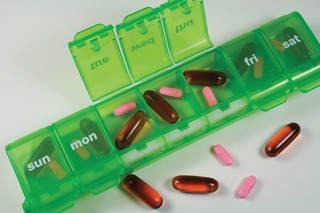Work with Your Doctor

Doctors are vital to your healthcare, but they are busy and not always easy to talk to. You can get the most out of your doctor visits if you:
Write Down Your Questions. List the most important ones first, in case you can't get to them all. Tell the doctor that you have questions, so he or she knows to save time. If you have a lot of questions, ask for a longer visit when you set up the appointment. Take notes to help remind you of what was said. Some clinics may give you a summary as you leave, which is useful.
Keep Your Own Health Notebook. Make a note of any symptoms you have, when they started, and what makes them better or worse. Keep records of your lab test results so you can see how you're doing (some people track their results on a computer). Bring your notes to your doctor visits in case the doctor has questions.
Explain What You Know (Briefly). The doctor does not have to start at the beginning if you have been doing your homework and learning about your CKD. You will both get more out of the visit if you can start on the same page.
Tell the Doctor What You Care About Most. Don't assume that he or she knows that you need to keep your job, or you have lost your appetite.
Ask if Something Does Not Make Sense to You. Doctors may use medical terms that you don't know. It's okay to say, "would you mind saying that in plain English?" Ask how terms are spelled so you can look them up later.
Bring Someone with You. It can help a lot to have an extra pair of ears. You may stop listening if the doctor says something that scares you, and miss something that you need to know.
Seek Treatment if You are Depressed

Feeling anxious, afraid, angry, or sad is very normal when you learn that you have CKD. You may even have all of these feelings at the same time. CKD is a blow to your sense of yourself as a healthy person. It can take time to adjust. You may even go through some or all of the Kubler-Ross stages of grieving before you accept CKD:
- Denial
- Anger
- Bargaining
- Depression
Depression is common when you have a life change you did not ask for and don’t want. It can sap your strength and make you feel helpless. If you feel sad, angry, or irritable for more than two weeks, it may be time to get help. Treatment may involve:
- Counseling — Talking to a therapist can help you put CKD in a context and feel better about the future. Ask your care team to refer you to one.
- Medicine — A number of medicines can ease depression.
- Exercise — Getting active can work as well as medicines for mild to moderate depression. Talk to your doctor before you start a new exercise plan.
Know Your Medicines

With CKD, your kidneys may slowly stop doing some of their jobs. The good news is, there are medicines that can pick up where your kidneys leave off.
Any drug can have side effects. Know your body and how you feel any time you start taking a new medicine. Tell your care team if you have any problems. These may go away in time. Or, the doctor may be able to prescribe a drug to help relieve a side effect.
Anemia Medicines
Anemia is a shortage of red blood cells that is common in CKD. It can make you feel weak, worn out, cold all the time, and mentally fuzzy. In men, anemia can make erectile dysfunction worse. Getting treatment for anemia can mean the difference between being able to keep a job and go on with life — or not. A hemoglobin blood test is used to find and treat anemia. There are two main treatments:
- Iron. Iron is a key building block for red blood cells. You may take iron as pills, an elixir, or in a vein. Cooking in cast iron pans can help boost your blood iron levels, too. And, some foods, like liver, are high in iron.
- ESAs. Erythrocyte (red blood cell) stimulating agents are man–made hormones that tell your body to make more red blood cells. ESAs are given by injection. You may be given one of these ESAs. At high doses, ESAs have been linked with heart attack, strokes, and blood clots. But, not treating anemia has risks for you, too. Talk with your doctor about the right dose of ESA for you.
Bone Disease Medicines

Healthy kidneys keep calcium and phosphorus (phosphate) in balance to keep your bones healthy. This balance starts to fail as the kidneys lose function. Four parathyroid glands in your neck check the level of calcium in your blood. If your level drops, the glands send out parathyroid hormone (PTH). PTH tells your bones to add calcium into your blood. In time, this loss of calcium can make bones weak and frail. Three treatments can help keep your bones healthy with CKD:
- Phosphate Binders. When you have too much phosphate in your blood, it can bind with extra calcium to form shards that can harm your bloods vessels and tissues. Binders attract excess phosphate in your gut, like a magnet attracts iron. They “bind” the phosphate, which is then removed in your stool.
- Active Vitamin D. Kidneys make active vitamin D, or calcitriol — a hormone that lets your gut absorb calcium. You may get active vitamin D as pills or injections. The drug will help keep your bones healthy.
- Prescription Drugs. This pill acts on the parathyroid glands to help shut them off so they don't make too much PTH. Keeping the right amount of PTH in your blood will help you keep calcium in your bones, where it belongs.
Cholesterol Medicines
Statins, or drugs to lower high cholesterol, may be prescribed to help protect your heart. If you take these, ask your doctor if you should also take the supplement Coenzyme Q10 (CoQ10). Statins use up CoQ10, which can lead to heart failure in people who take them. Taking CoQ10 with statins can help protect the heart from this type of damage.

